
1965
"I Can’t Explain" was released in the U.K. January 15 but took three months of heavy lifting by The Who and their management before it reached its #8 peak in the charts. Meanwhile all of trendy London trekked to the Marquee on Tuesdays, leaving drenched in sweat and shouting to each other over the ringing in their ears about this incredibly loud, incredibly exciting band.
Some of that wildness made it into their next single, "Anyway Anyhow Anywhere" released May 21 with a middle instrumental section filled with runaway drums and piercing guitar feedback. The Who switched from being a Mod band to being a Pop-art band, wearing T-shirts with medals and Royal Air Force insignia and, most famously, a jacket made from the British flag. Pete, meanwhile, gave interview after interview making outrageous statements, his already existing tendency to verbosity egged on by managers Lambert and Stamp. From this point on The Who and particularly Pete were seen by the music press as a perpetual source for good copy.
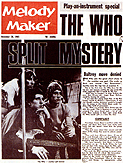
On September 26 Roger and Keith got into a brawl over Keith’s pill use after a show in Denmark. Roger was fired after the group’s return to England but was allowed back in until a suitable replacement could be found. For the next year the music press was filled with reports of The Who at each other’s throats, reports that were often true as Roger remained on probation and Keith and John auditioned for other bands, desperate to find a way out.
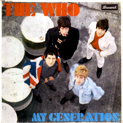
Pete channeled his anger into The Who’s third single, inspired when the Queen Mother had his car towed from its spot in front of his managers’ offices because it offended her sensibilities during her morning drive. "My Generation," released October 29, was the Sixties’ most searing condemnation of the older generation. Its most quoted line, "hope I die before I get old," became the band’s signature lyric. The Who’s first album, also titled My Generation, followed on December 3.
1966
Desperate for money, suffering under the terms of their contract with producer Shel Talmy and ignored by their American label Decca, The Who’s managers decided to break the contract and, in January, signed The Who to Atlantic in the U.S. and Robert Stigwood’s new label Polydor through the rest of the world. Talmy countered with a lawsuit that hampered the band throughout the year until it was settled in October with The Who remaining on Polydor but returning to Decca in the U.S.
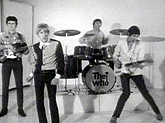
Pete handled the production of the Who’s new single, "Substitute," himself. Released March 4, it marked a switch from the wild feedback-laden sound of 1965 to a hard-driving pop music Pete dubbed "power pop."
Another innovation followed May 10 when Pete presented his manager Kit Lambert with a homemade parody track he referred to as a "rock opera." Lambert, with his family training in classical music, leapt upon the idea and encouraged Pete to start writing a real rock opera. Pete’s first attempt became The Who’s next single, "I’m A Boy," released August 26. The bizarre tale of a boy raised as a girl was a fragment of an opera called "Quads" that remained unfinished as Pete explored other concepts. "I’m A Boy" was The Who’s biggest hit single in Britain, reaching #1 on the Melody Maker chart.
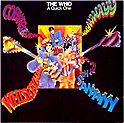
The year ended with The Who’s second LP, A Quick One, featuring songs written by all the members of The Who as part of a money-raising publishing scheme devised by their managers. The album, released December 3, marked the emergence of John Entwistle as another writer in The Who stable. His darkly humorous style was evident in the album’s track "Boris The Spider" that became his signature song. Also of note was the album’s concluding track, "A Quick One While He’s Away," a nine-minute long "mini-opera."
1967
On March 16, The Who’s managers launched a label of their own, Track Records, not only to publish The Who’s records in Britain, but other artists as well. The label’s first act signed was The Jimi Hendrix Experience and Track’s success spurred other major British acts to consider starting their own labels.
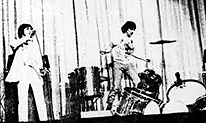
The Who’s sixth official single, "Happy Jack," was held back in America to coincide with the band’s arrival there, playing two songs five times a day at the Murray The K extravaganza in New York March 25 – April 3. Each performance ended with smoke bombs and smashed instruments that shocked jaded New York audiences, gaining the band an immediate cult following. "Happy Jack" became the first Who single to reach the U.S. Top Forty.
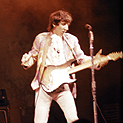
photo: Bruce Fleming
The Who returned to the U.S. June 18 to play at the prestigious Monterey Pop Festival where the band had a tussle with fellow Polydor performer Jimi Hendrix who intended to use The Who’s same instrument-smashing conclusion. The Who won a coin toss and went first. On his way home from the festival Pete popped a new psychedelic, STP, that provoked a lengthy trip Pete would later describe as "painful." Pete swore off drugs and began to look for other paths to higher consciousness.
The Who were back a month later to begin their first lengthy tour of North America opening for the teeny-bopper band Herman’s Hermits. They ended up spending more than they made. The expenses of the instrument-smashing conclusion to their act were part of the reason but some of the cost came from destruction that was done offstage as Keith began his secondary career as a wild man. He may not have actually driven a car into a swimming pool at a Holiday Inn (Roger says yes, everyone else there says no) but he did more than enough damage to other hotels along the route, blowing up toilets and doors off hinges after he purchased firecrackers during the tour’s Southern leg. From this point on, Keith would leave hotel rooms in shambles wherever The Who toured.
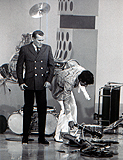
One of his wildest moments of mayhem came after the premiere of The Who’s new single "I Can See For Miles" on the U.S. variety show The Smothers Brothers Comedy Hour September 15. Following with "My Generation," The Who’s performance ended when Keith blew his drum set apart with explosives. The publicity propelled "I Can See For Miles" to #9 in the U.S. Billboard charts, their highest position for a single in the U.S. In the U.K., however, the band were dubbed old hat along with many other groups from the 1963-1965 period and the single barely squeaked into the Top Ten. The single’s disappointing showing caused Pete to have a crisis of confidence. Feeling he could no longer write hit singles for The Who, he turned his full attention to completing a rock opera.
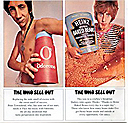
A cast-off of his latest attempt, "Rael," climaxed the band’s third album The Who Sell Out, released December 15. With its comical cover and imitation of a broadcast on recently outlawed pirate radio, the album did not match the chart success of their previous LP’s but became, in time, a critical favorite.








